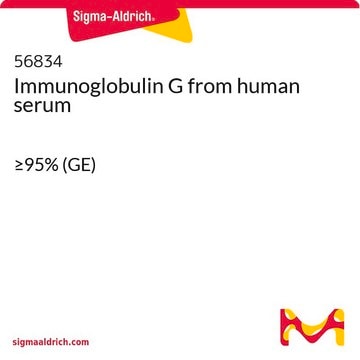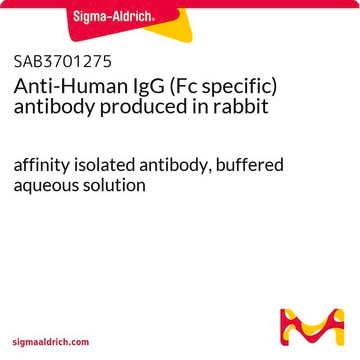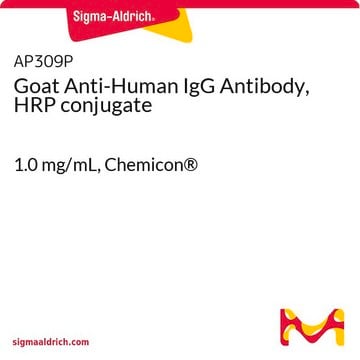AG100
Human IgG Fc Control Protein, recombinant protein
Iniciar sesiónpara Ver la Fijación de precios por contrato y de la organización
About This Item
UNSPSC Code:
12352203
eCl@ss:
32160702
NACRES:
NA.42
Productos recomendados
biological source
human
Quality Level
assay
>90% (Coomassie blue staining, SDS-PAGE)
manufacturer/tradename
Chemicon®
concentration
1 mg/mL
shipped in
dry ice
General description
Product Source: Mammalian cells, HEK293 cell line
Recombinatant fusion proteins consisting of the extracellular domain of immunoregulatory proteins and the constant (Fc) domain of immunoglobulin G (IgG) represent a growing class of human therapeutics. Chimeric protein of Human target protein and Human IgG-Fc domain can be purified using protein A chromatography.
This product is the control protein, Human IgG-Fc domain, purified using protein A-agarose (Millipore Corp, cat. # 16-125). MW ~ 55 kDa.
This product is the control protein, Human IgG-Fc domain, purified using protein A-agarose (Millipore Corp, cat. # 16-125). MW ~ 55 kDa.
Application
Research Category
All
All
This product should be used as the control protein in the activity test of chimeric protein of Human target protein and Human IgG-Fc domain.
Other applications of Human IgG-Fc domain.
Other applications of Human IgG-Fc domain.
Packaging
Active, as purified using protein A-agarose (Millipore Corp, cat. # 16-125).
Physical form
50µg of recombinant protein in 50µl of 1X PBS, 20%(v/v) glycerol. Frozen solution.
Storage and Stability
Shipped on dry ice. Best stored at -80 C for up to 6 months after date of receipt. Thawed aliquots should be used immediately, as repeated freeze/thaw cycles might result in loss of activity.
Analysis Note
Western blotting by primary antibody Mouse anti-Human IgG, clone HP6017, Fc (Millipore Corp, cat.# MAB1302) and secondary antibody Goat anti-Mouse IgG, HRP conjugate (Millipore Corp, cat.# 12-349).
Legal Information
CHEMICON is a registered trademark of Merck KGaA, Darmstadt, Germany
Disclaimer
Unless otherwise stated in our catalog or other company documentation accompanying the product(s), our products are intended for research use only and are not to be used for any other purpose, which includes but is not limited to, unauthorized commercial uses, in vitro diagnostic uses, ex vivo or in vivo therapeutic uses or any type of consumption or application to humans or animals.
Storage Class
10 - Combustible liquids
wgk_germany
WGK 2
Certificados de análisis (COA)
Busque Certificados de análisis (COA) introduciendo el número de lote del producto. Los números de lote se encuentran en la etiqueta del producto después de las palabras «Lot» o «Batch»
¿Ya tiene este producto?
Encuentre la documentación para los productos que ha comprado recientemente en la Biblioteca de documentos.
Los clientes también vieron
Mark A Webber et al.
Antimicrobial agents and chemotherapy, 49(10), 4390-4392 (2005-09-29)
Fluoroquinolone-resistant Escherichia coli isolates which overexpressed acrB and had a substitution at amino acid 45 of AcrR were complemented with wild-type acrR. Complementation led to increased sensitivity to ciprofloxacin and to ethidium bromide, suggesting that mutation at amino acid 45
Cell adhesive peptide screening of the mouse laminin ?1 chain G domain.
Kentaro Hozumi,Taneyasu Akizuki,Yuji Yamada,Toshihiro Hara,Shunsuke Urushibata et al.
Archives of Biochemistry and Biophysics null
Fluorometric determination of ethidium bromide efflux kinetics in Escherichia coli.
Laura Paix?o,Liliana Rodrigues,Isabel Couto,Marta Martins,Pedro Fernandes et al.
Journal of Biological Engineering null
Luke P Randall et al.
The Journal of antimicrobial chemotherapy, 56(2), 297-306 (2005-06-16)
To determine the efficacy of enrofloxacin (Baytril) in chickens in eradicating three different resistance phenotypes of Salmonella enterica and to examine the resistance mechanisms of resulting mutants. In two separate replicate experiments (I and II), three strains of Salmonella enterica
Fei Zhang et al.
Journal of medical virology, 93(12), 6671-6685 (2021-07-30)
Infection by severe acute respiratory syndrome coronavirus 2 (SARS-CoV-2) causes a wide spectrum of syndromes involving multiple organ systems and is primarily mediated by viral spike (S) glycoprotein through the receptor-binding domain (RBD) and numerous cellular proteins including ACE2, transmembrane
Nuestro equipo de científicos tiene experiencia en todas las áreas de investigación: Ciencias de la vida, Ciencia de los materiales, Síntesis química, Cromatografía, Analítica y muchas otras.
Póngase en contacto con el Servicio técnico









